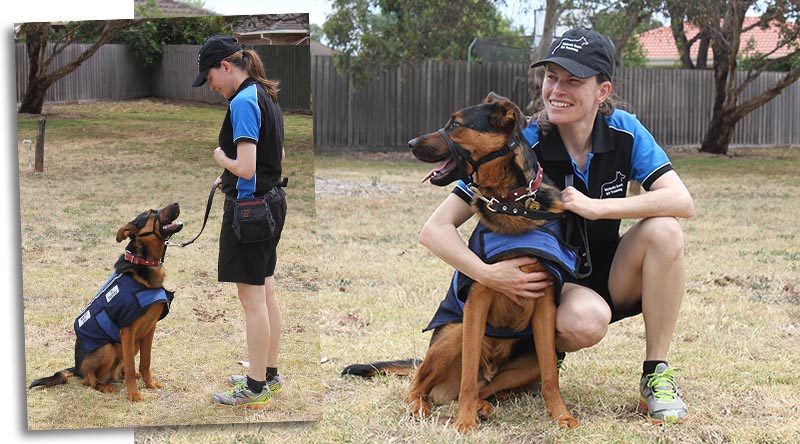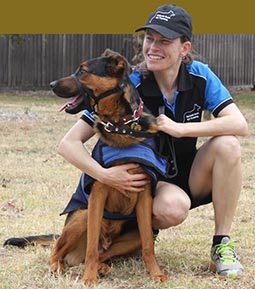Training Session #5 – Service Dogs: Part 4

In this fourth part to my series on Service Dogs, I want to get in to some nitty gritty regarding training a Service Dog.
View all Melanie Scott’s dog-training blogs here.
.
Training:
There are many benefits in training your own Service Dog or being heavily involved in the training process.
Working with your dog helps build your confidence and trust.
“Fear travels down the lead” is a commonly used expression in dog training.
You must try to curb your own fears and anxiety or your dog will sense your distress and may exhibit fear or nervousness himself.
This process of calming yourself is beneficial to you and your dog provides you with instant feedback on how you are travelling emotionally.
Considerations:
-

Melanie Scott and trainee Service Dog Paddington at the train station. Do you have experience in training dogs in obedience – if not, are you willing to learn?
- Do you know how to train specific tasks required to alleviate your medical condition?
- Do you have the time and dedication required to train a Service Dog?
- Do you want a Service Dog or would you be happier with a therapy dog that can provide you with specific help at home without all the public-access training?
- Service Dogs draw lots of attention – is this something you can handle emotionally?
- Can you afford a Service Dog, allowing for expenses which may include hiring professional dog-training assistance if required?
I’d like a Service Dog, how do I find a trainer?
In many cases if you are sourcing a dog through an organisation they will have a list of preferred trainers or provide the training for you.
In some states, Service Dog trainers are required to have qualifications recognised by the State government.
If you are thinking of training your own dog with the assistance of a trainer, look at their qualifications, experience, reputation and training methods – and then give them a go.
If you don’t like them you can change trainers.
In my personal opinion, Service Dog trainers should be compassionate and understand your medical condition, your individual needs and your dog’s personality in order to tailor a program that suits both you and your dog.
At the end of the day, you need to build rapport and trust with your trainer to help you gain the most out of your training sessions.
The more confident you are, the more confident your dog will be.
Service Dog trainers can be expensive and, as is often the case, you get what you pay for.
Individual home consults are more expensive than group classes at the local dog club and provide one-on-one help.
Group classes are more social for both you and your dog.
The guidance of a reputable trainer can help negotiate any little problems or hiccups as soon as they occur.
Problems are significantly easier to fix sooner rather than later.
At the end of the day, it is your choice – think about what you require and how much you are willing to pay.
Remember, a Service Dog isn’t just a companion, he’s a life saver.
.
.
,
Melanie Scott is a former police officer with PTSD. She is a qualified dog trainer who is passionate about dogs and helping first responders. Melanie Scott K9 Training (MSK9T) offers a variety of services including group dog-obedience classes, puppy classes, private in-home consults, as well as therapy and service-dog training. You can contact Melanie on 0448 395 797 or visit her web site.
.
.
.
.
.
.
.
.

.
.






